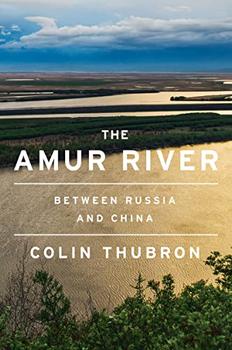Summary | Excerpt | Reviews | Beyond the Book | Readalikes | Genres & Themes | Author Bio

Between Russia and China
by Colin Thubron1
The Source
Across the heart of Asia, at the ancient convergence of steppe and forest, the grasslands of Mongolia move towards Siberia in a grey-green sea.
The land's silence is almost unbroken. It is barely inhabited. At its farthest reach, near the Russian frontier, almost five thousand square miles are forbidden to travellers. These mountains, once the homeland of Genghis Khan, are today a near-sacred wilderness. The solitary track that reaches them ends at a barrier and a rangers' lodge. And here we wait – a guide, two horsemen and I – to enter a region that none of us truly knows.
Somewhere deep in this hinterland rises one of the most formidable rivers on earth. It drains a basin twice the size of Pakistan, and more than two hundred tributaries, some of them immense, pour into its flood in spring. For over a thousand miles it forms the border between Russia and China: a fault-line shrouded in old mistrust.
The Amur is elusive. Even the name's origin is obscure. To the West the river seems unreachably remote, and few people have even heard of it. There are wildly different estimates of its length, naming it the tenth or even eighth longest river in the world. Its Chinese shore is almost untravelled, while razor wire and watchtowers shadow its Russian bank from end to end in the most densely fortified frontier on earth.
A day goes by, and then a night, while we wait to cross into these proscribed mountains. The rangers in this country, named the Khenti Strictly Protected Area, are reluctant to release us, although I have permits secured by the trusted agent who found my guide and horsemen. I feel a first twinge of unease. Our three tents, pitched in the meadow grasses, are beginning to look forlorn, and the elation of starting out – the visceral excitement, the tingle of apprehension – is ebbing into the fear that we may never start at all. At night I am woken by our horses cropping the grass outside my tent. It is that hour when the mind darkens; and suddenly the notion of following a river of 2,826 miles (the favoured estimate), as it flows through south-east Siberia then meets China, then breaks for the Pacific, seems little more than a fantasy.
I open my tent-flap on the cold dark, and catch my breath. My shadow falls black over the grass. The night above me blazes with stars, and across that immense Mongolian sky the Milky Way moves in an icy torrent of light.
Dawn spreads the thin radiance of another planet. The world seems still unstained. In the distances around us the sun is lifting a glistening mist above grasslands heavy with dew. It is as if a great fire were burning over the plains. For a while it obscures the hills that fringe the skyline, then its haze dissolves as though we had imagined it. The air grows warmer. Tiny diurnal moths are rising from the grasses, where invisible warblers sing, and the air fills with the click and whirr of grasshoppers. To walk here is to wade through a tide of wildflowers: multicoloured asters, gentians, butter-coloured potentilla, peacock-blue columbines. Over farther slopes, swathes of blown edelweiss make a frosty pallor for miles.
Then the horsemen emerge, heavy in their native deel overcoats, their daggers at their belts, to check our tethered mounts. It is well into morning before the rangers appear. They come to our tents on motorbikes, in their outsize boots and piratical headbands. They carry little briefcases. Batmonkh, my guide, a native of Mongolia's capital, says they are feeling important because the prime minister has arrived here on pilgrimage to Burkhan Khaldun, the mountain sacred to Genghis Khan. But they remain with us a long time, eating our biscuits and scrutinizing our papers. The country ahead of us is dangerous, they say, and almost impassable. The most distant tributary of the Amur, the Onon river, rises in remote marshlands, and the monsoons had been heavy that summer. Now, in late August, the ground is flooded and treacherous. And there are bears. Once inside the reserve, we will be beyond help.
Excerpted from The Amur River by Colin Thubron. Copyright © 2021 by Colin Thubron. Excerpted by permission of Harper. All rights reserved. No part of this excerpt may be reproduced or reprinted without permission in writing from the publisher.
Your guide toexceptional books
BookBrowse seeks out and recommends the best in contemporary fiction and nonfiction—books that not only engage and entertain but also deepen our understanding of ourselves and the world around us.